 Sep 18, 2009 - 12:02 PM Sep 18, 2009 - 12:02 PM
|
|
|
Enthusiast   Joined Jan 28, '09 From Austin, TX Currently Offline Reputation: 0 (0%) |
EDIT START 9/22/2009
Pictures of the final version of the downpipe * v-band 38mm TIAL wastegate * All stainless steel * Stainless steel 3" interlocking flex section * Included wideband O2 sensor bung and Toyota O2 sensor bung 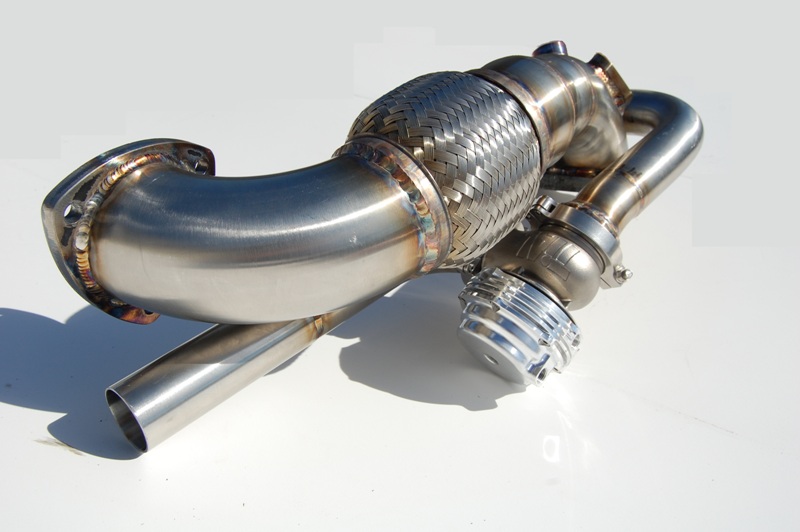 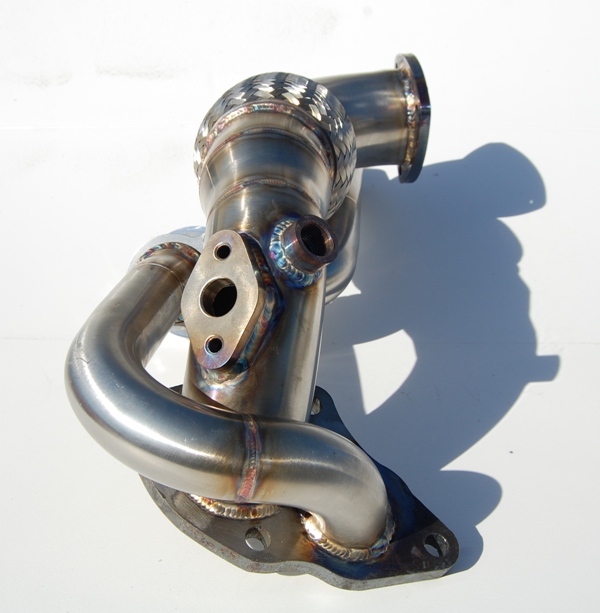 EDIT END 9/22/2009 We're finishing up the final revisions to our turbo kit. The final production version should be available for sale soon (within the next few months). Revisions from what you've seen in the past from various prototypes: * Flex section added to the downpipe * Tial 38mm v-band external wastegate option * Stainless steel turbine housing * -4AN braided stainless steel oil feed * -10AN braided stainless steel oil drain * Stainless steel 3" downpipe * Stock heatshield works and bolts on with our kit * Turbine inlet gasket matched for maximum flow * Various configurations available to support anywhere from an insanely fast spooling 300whp setup all the way to a monster 600whp capable setup that will spool quicker than any other 600whp capaable turbo kit around. * Lifetime warranty on the tubo kit (1 year on the turbo internals) * Kit made in the USA * The turbo's being used with the kit are manufactured by Borg Warner A few more pictures 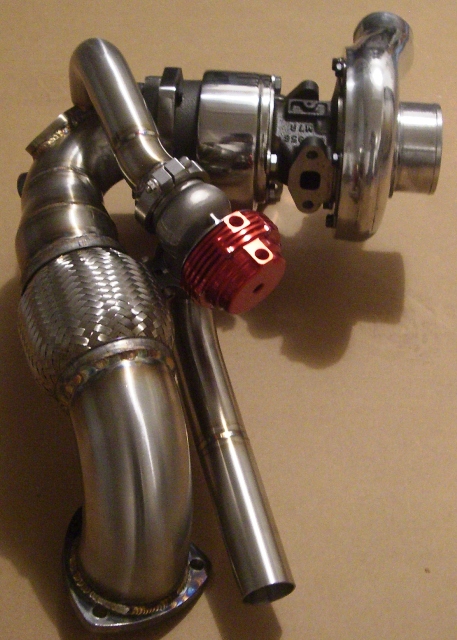 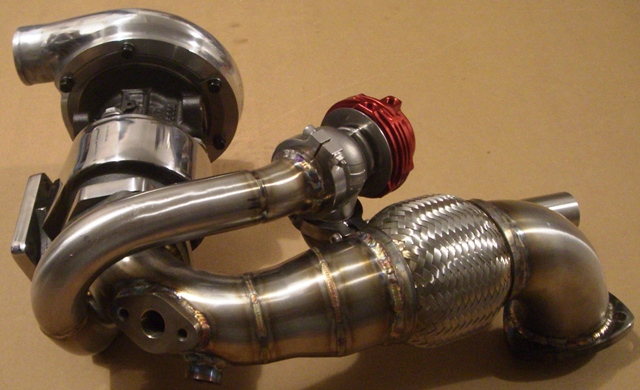 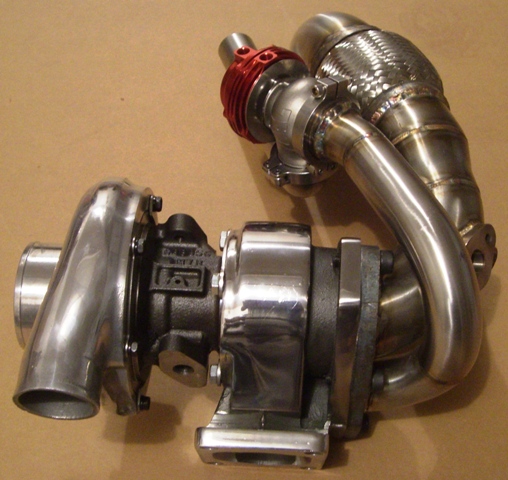 A couple dyno's from various setups that some of our testers have been playing around with: Stock Gen3 3sgte MR2. 93 octane pump gas. Stock Longblock. Stock ECU. Stock fueling. No tuning. EMSPowered 4" intake. EMSPowered S252 Turbo Kit @ 17psi (this turbo is capable of around 450-500whp: 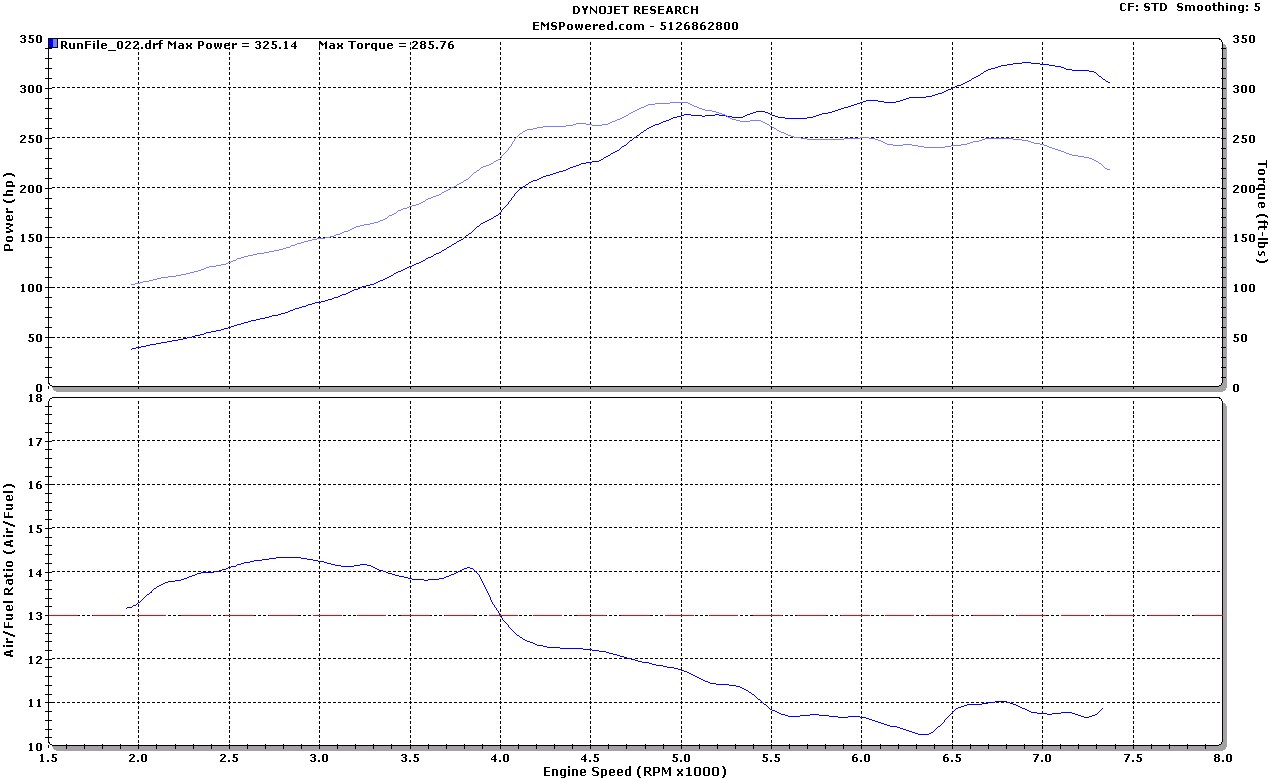 Gen2 3sgte MR2. 93 octane pump gas. Stock cams. 550cc injectors. EMSPowered 50trim Turbo Kit @ 14psi (this turbo is capable of around 400-450whp). This was a prototype kit that was not using our new Stainless Steel turbine housing, so spool is slower by about 150rpm on this dyno and power is lower by about 15-30hp: 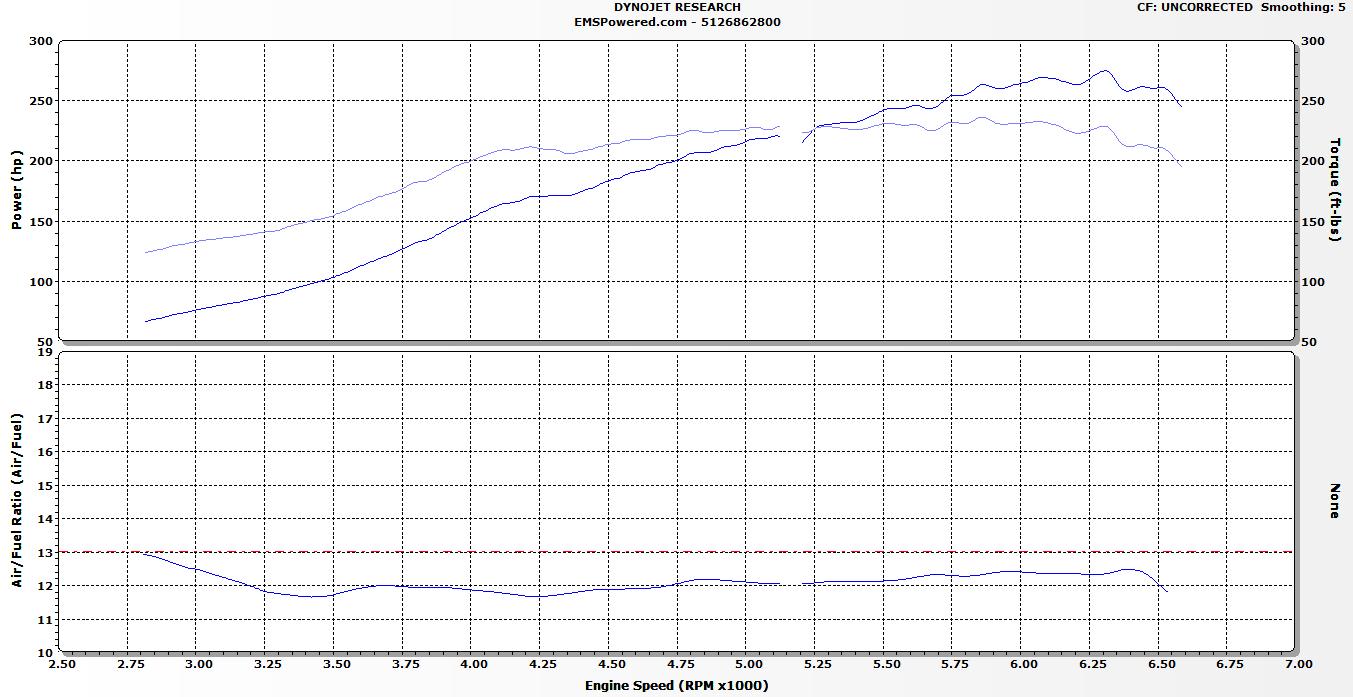
This post has been edited by baktasht: Sep 25, 2009 - 1:10 PM -------------------- |
 |
Replies
 Sep 18, 2009 - 8:15 PM Sep 18, 2009 - 8:15 PM
|
|
|
Enthusiast  Joined Sep 14, '09 Currently Offline Reputation: 1 (100%) |
I am having trouble understand what your point is. You are trying to give advice as to how this vendor SHOULD HAVE displayed his dyno results? If you are, most vendors offer results of there product in the same fashion as Backtash did (aka as in using testers) which IMO is better for real world performance...especially when you have a few different dyno runs to compare to. You can then find the "average" performance gain expected from what ever product that vendor may be selling. I personally am more interested in seeing 5-10 different dyno setups all running the factory ECU with no tuning capabilities (as then the tune is a constant amongst all setups) then a super risky dyno queen number that was performed on race gas to make a product seem better then it really is. At least with testing a few different cars (testers) you have a constant...and that being the turbo and the tune. And as long as YOUR motor is good health like the motors tested on, you will KNOW what kind of gains you will see. I dont really understand your comparison of this turbo kit to a set of cams either? That is comparing apples to oranges again....maybe you can elaborate on that a bit more. Again let me start by saying I'm not and was not trying to bash the product! OK Jim It's easier for me to reply in the reverse order to your questions so i will do just that. QUOTE I dont really understand your comparison of this turbo kit to a set of cams either? That is comparing apples to oranges again....maybe you can elaborate on that a bit more. call me a bean counter but to me, from a consumer standpoint, a purchase is a purchase when the primary objective is horsepower. In that regard I'm not comparing apples to oranges I'm comparing dollars to dollars for the same horsepower result as given on a dyno. That was the entire point I was hoping to make by using that analogy. QUOTE I personally am more interested in seeing 5-10 different dyno setups all running the factory ECU with no tuning capabilities (as then the tune is a constant amongst all setups) then a super risky dyno queen number that was performed on race gas to make a product seem better then it really is. At least with testing a few different cars (testers) you have a constant...and that being the turbo and the tune. And as long as YOUR motor is good health like the motors tested on, you will KNOW what kind of gains you will see. This is useful to you personally but to a wider range of perspective users of the same product many of which have little knowledge or experience like you do, and are half way around the world from you like i am, it offers very little by way of consistency(repeatable results). There is no way to know what condition each motor in the 5-10 setups you refer to were in at the time of testing therefore making it more difficult to someone purchasing a kit to repeat the same results. If you can evaluate that the factory turbo performs to X peak value on an engine that has been blueprinted to manufacturer specifications, then you can evaluate that your upgrade turbo or turbo kit adds Y amount of power, and you have two immediate and considerable advantages. 1. a perspective customer anywhere in the world with little or no knowledge of tuning and upgrades can rest assured that under similar conditions your kit will provide a similar increase in power on an engine of the same rebuild status providing that the external and limiting factors are similar. 2. After sale support and warranty/guaranty issues become less sketchy as it should be quite clearcut that if a customer does not achieve similar performance figures that the turbo or kit is the least likely thing causing the problem. QUOTE most vendors offer results of there product in the same fashion as Backtash did (aka as in using testers) which IMO is better for real world performance...especially when you have a few different dyno runs to compare to. You can then find the "average" performance gain expected from what ever product that vendor may be selling. Most vendors publish information in a manner that is misleading and sometimes completely useless to customers. It does not mean that we should endorse their shortcomings. "having a few different dyno runs to compare -WHAT? - to"? your engine? who's to say that your engine is currently at the same spec as the one they used? and believe it or not even the manufacturer spec is not any real bullet proof sort of guaranty that you will get repeatable performance across the board between engines at that spec. Having to accept that inevitability, the best approach in my opinion is still being able to know the limit of the manufacturer spec which is fairly easily attainable and repeatable around the world. QUOTE I am having trouble understand what your point is. You are trying to give advice as to how this vendor SHOULD HAVE displayed his dyno results? Essentially my advice was based on the premise that depending on your approach in the development of your product the results or dyno results you are able to display can be of more use to perspective customers. |
Posts in this topic
 baktasht EMSPowered Turbo Kit - Coming Soon! Sep 18, 2009 - 12:02 PM
baktasht EMSPowered Turbo Kit - Coming Soon! Sep 18, 2009 - 12:02 PM
 Mstoochn would of been nice to of seen this like... 3 weeks... Sep 18, 2009 - 1:53 PM
Mstoochn would of been nice to of seen this like... 3 weeks... Sep 18, 2009 - 1:53 PM

 baktasht QUOTE (Mstoochn @ Sep 18, 2009 - 1:5... Sep 18, 2009 - 2:02 PM
baktasht QUOTE (Mstoochn @ Sep 18, 2009 - 1:5... Sep 18, 2009 - 2:02 PM
 95st-celica maybe im missing something here...but on a stock 3... Sep 18, 2009 - 2:39 PM
95st-celica maybe im missing something here...but on a stock 3... Sep 18, 2009 - 2:39 PM

 _Jim_ QUOTE (95st-celica @ Sep 18, 2009 ... Sep 18, 2009 - 2:48 PM
_Jim_ QUOTE (95st-celica @ Sep 18, 2009 ... Sep 18, 2009 - 2:48 PM

 baktasht QUOTE (95st-celica @ Sep 18, 2009 ... Sep 18, 2009 - 3:17 PM
baktasht QUOTE (95st-celica @ Sep 18, 2009 ... Sep 18, 2009 - 3:17 PM
 _Jim_ GREAT STUFF BAKTASH, I got my turbo in last week a... Sep 18, 2009 - 2:40 PM
_Jim_ GREAT STUFF BAKTASH, I got my turbo in last week a... Sep 18, 2009 - 2:40 PM
 95st-celica i didnt know all the little detalis...that makes s... Sep 18, 2009 - 3:26 PM
95st-celica i didnt know all the little detalis...that makes s... Sep 18, 2009 - 3:26 PM
 6gtfour I truly hate to post seemingly negative comments a... Sep 18, 2009 - 6:49 PM
6gtfour I truly hate to post seemingly negative comments a... Sep 18, 2009 - 6:49 PM

 _Jim_ QUOTE (6gtfour @ Sep 18, 2009 - 7:49... Sep 18, 2009 - 7:17 PM
_Jim_ QUOTE (6gtfour @ Sep 18, 2009 - 7:49... Sep 18, 2009 - 7:17 PM

 _Jim_ QUOTE (6gtfour @ Sep 18, 2009 - 9:15... Sep 19, 2009 - 7:50 AM
_Jim_ QUOTE (6gtfour @ Sep 18, 2009 - 9:15... Sep 19, 2009 - 7:50 AM
 lagos QUOTE 1. a perspective customer anywhere in the wo... Sep 19, 2009 - 2:24 PM
lagos QUOTE 1. a perspective customer anywhere in the wo... Sep 19, 2009 - 2:24 PM

 _Jim_ QUOTE (lagos @ Sep 19, 2009 - 2:24 P... Sep 19, 2009 - 6:36 PM
_Jim_ QUOTE (lagos @ Sep 19, 2009 - 2:24 P... Sep 19, 2009 - 6:36 PM
 baktasht 6gtfour, thanks for the input. I always appreciate... Sep 19, 2009 - 10:33 PM
baktasht 6gtfour, thanks for the input. I always appreciate... Sep 19, 2009 - 10:33 PM
 baktasht Pictures of the final version of the downpipe
* v... Sep 21, 2009 - 6:03 PM
baktasht Pictures of the final version of the downpipe
* v... Sep 21, 2009 - 6:03 PM

 _Jim_ QUOTE (baktasht @ Sep 21, 2009 - 7:0... Sep 21, 2009 - 6:08 PM
_Jim_ QUOTE (baktasht @ Sep 21, 2009 - 7:0... Sep 21, 2009 - 6:08 PM
 presure2 VERY nice. Is this the same basic setup that Texas... Sep 21, 2009 - 7:10 PM
presure2 VERY nice. Is this the same basic setup that Texas... Sep 21, 2009 - 7:10 PM

 baktasht QUOTE (presure2 @ Sep 21, 2009 - 7:1... Sep 21, 2009 - 7:44 PM
baktasht QUOTE (presure2 @ Sep 21, 2009 - 7:1... Sep 21, 2009 - 7:44 PM

 presure2 QUOTE (baktasht @ Sep 21, 2009 - 7:4... Sep 21, 2009 - 7:49 PM
presure2 QUOTE (baktasht @ Sep 21, 2009 - 7:4... Sep 21, 2009 - 7:49 PM

 baktasht QUOTE (presure2 @ Sep 21, 2009 - 7:4... Sep 21, 2009 - 7:54 PM
baktasht QUOTE (presure2 @ Sep 21, 2009 - 7:4... Sep 21, 2009 - 7:54 PM
 _Jim_ soon enough Sep 21, 2009 - 7:50 PM
_Jim_ soon enough Sep 21, 2009 - 7:50 PM
 RUNNIN-LOW QUOTE (baktasht @ Sep 21, 2009 - 6:0... Sep 21, 2009 - 10:21 PM
RUNNIN-LOW QUOTE (baktasht @ Sep 21, 2009 - 6:0... Sep 21, 2009 - 10:21 PM
 baktasht Added a few more pictures to the first post. Sep 25, 2009 - 1:10 PM
baktasht Added a few more pictures to the first post. Sep 25, 2009 - 1:10 PM
 _Jim_ GORGEOUS Baktash, amazing as always. We will have... Sep 25, 2009 - 2:09 PM
_Jim_ GORGEOUS Baktash, amazing as always. We will have... Sep 25, 2009 - 2:09 PM
 Terracar I think the point 6gtfour is trying to make he wou... Sep 25, 2009 - 3:16 PM
Terracar I think the point 6gtfour is trying to make he wou... Sep 25, 2009 - 3:16 PM
 6gtfour QUOTE (Terracar @ Sep 25, 2009 - 4:1... Sep 26, 2009 - 5:22 PM
6gtfour QUOTE (Terracar @ Sep 25, 2009 - 4:1... Sep 26, 2009 - 5:22 PM
 supershannon77 I'm really excited to see what my kind of magi... Sep 26, 2009 - 8:52 PM
supershannon77 I'm really excited to see what my kind of magi... Sep 26, 2009 - 8:52 PM
 enderswift amazing quality! Sep 27, 2009 - 1:56 AM
enderswift amazing quality! Sep 27, 2009 - 1:56 AM
 OOBE Those welds look as good as the ones on the GE T-7... Sep 27, 2009 - 2:06 AM
OOBE Those welds look as good as the ones on the GE T-7... Sep 27, 2009 - 2:06 AM
 baktasht Will be posting the introductory sale this week. Sep 29, 2009 - 8:53 AM
baktasht Will be posting the introductory sale this week. Sep 29, 2009 - 8:53 AM
 jeffrosie Will you be able to post this kit to U.K.?
Looks l... Sep 29, 2009 - 2:41 PM
jeffrosie Will you be able to post this kit to U.K.?
Looks l... Sep 29, 2009 - 2:41 PM

 baktasht QUOTE (jeffrosie @ Sep 29, 2009 - 2... Sep 29, 2009 - 2:51 PM
baktasht QUOTE (jeffrosie @ Sep 29, 2009 - 2... Sep 29, 2009 - 2:51 PM
 3WayStunna Well as wonderful as the pics are here, i just hav... Sep 29, 2009 - 3:14 PM
3WayStunna Well as wonderful as the pics are here, i just hav... Sep 29, 2009 - 3:14 PM

 baktasht QUOTE (3WayStunna @ Sep 29, 2009 - 3... Sep 29, 2009 - 3:36 PM
baktasht QUOTE (3WayStunna @ Sep 29, 2009 - 3... Sep 29, 2009 - 3:36 PM
 6gtfour MR2 Bolt-on Turbo Kit (300-625hp)
Retail Price: St... Sep 29, 2009 - 5:25 PM
6gtfour MR2 Bolt-on Turbo Kit (300-625hp)
Retail Price: St... Sep 29, 2009 - 5:25 PM

 baktasht QUOTE (6gtfour @ Sep 29, 2009 - 5:25... Sep 29, 2009 - 5:51 PM
baktasht QUOTE (6gtfour @ Sep 29, 2009 - 5:25... Sep 29, 2009 - 5:51 PM

 3WayStunna QUOTE (6gtfour @ Sep 29, 2009 - 6:25... Sep 29, 2009 - 11:52 PM
3WayStunna QUOTE (6gtfour @ Sep 29, 2009 - 6:25... Sep 29, 2009 - 11:52 PM
 lagos QUOTE (6gtfour @ Sep 29, 2009 - 6:25... Sep 29, 2009 - 5:28 PM
lagos QUOTE (6gtfour @ Sep 29, 2009 - 6:25... Sep 29, 2009 - 5:28 PM
 yellowchinaman This is a very nice down pipe. Definately a differ... Oct 1, 2009 - 2:16 PM
yellowchinaman This is a very nice down pipe. Definately a differ... Oct 1, 2009 - 2:16 PM

 baktasht QUOTE (yellowchinaman @ Oct 1, 2009 - 2... Oct 1, 2009 - 2:24 PM
baktasht QUOTE (yellowchinaman @ Oct 1, 2009 - 2... Oct 1, 2009 - 2:24 PM
 97celiman forgive my ignorance...what is the purpose of the ... Oct 1, 2009 - 2:36 PM
97celiman forgive my ignorance...what is the purpose of the ... Oct 1, 2009 - 2:36 PM

 baktasht QUOTE (97celiman @ Oct 1, 2009 - 2:3... Oct 1, 2009 - 2:39 PM
baktasht QUOTE (97celiman @ Oct 1, 2009 - 2:3... Oct 1, 2009 - 2:39 PM
 Detatch QUOTE (baktasht @ Sep 18, 2009 - 1:0... Oct 7, 2009 - 4:34 AM
Detatch QUOTE (baktasht @ Sep 18, 2009 - 1:0... Oct 7, 2009 - 4:34 AM

 baktasht QUOTE (Detatch @ Oct 7, 2009 - 4:34 ... Oct 7, 2009 - 1:37 PM
baktasht QUOTE (Detatch @ Oct 7, 2009 - 4:34 ... Oct 7, 2009 - 1:37 PM
 6gtfour any all wheel drive dyno runs with big boost yet o... Oct 21, 2009 - 10:42 PM
6gtfour any all wheel drive dyno runs with big boost yet o... Oct 21, 2009 - 10:42 PM
 baktasht QUOTE (6gtfour @ Oct 21, 2009 - 10:4... Oct 25, 2009 - 11:24 PM
baktasht QUOTE (6gtfour @ Oct 21, 2009 - 10:4... Oct 25, 2009 - 11:24 PM  |
4 User(s) are reading this topic (4 Guests and 0 Anonymous Users)
0 Members:
| Lo-Fi Version | Time is now: November 28th, 2024 - 4:22 PM |




